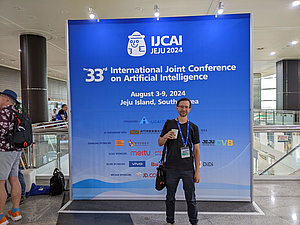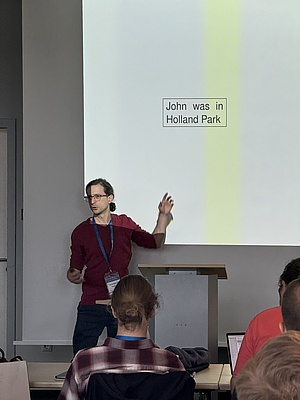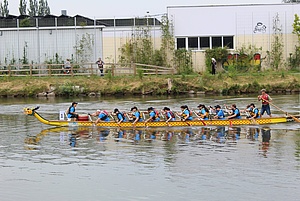Habilitation Talk by Wallner

06.12.2024
During the 20 year celebration of the Faculty of Computer Science and Biomedical Engineering (CSBME), Wallner gave a presentation of his habilitation work ("HabilTalk"). The topic was on several computational aspects in the field of argumentation in Artificial Intelligence. We thank the faculty for organizing this pleasant event!
Invitation to Early Career Track at IJCAI 2024

15.07.2024
At IJCAI 2024, Wallner will present recent works on the topic of "Computational Argumentation: Reasoning, Dynamics, and Supporting Explainability" in the Early Career track of the conference, which is a by invitation only track. In this talk, an overview of recent advances of algorithmic approaches to argumentative reasoning including static and dynamic forms is given, and ways of supporting explainability are discussed.
Invited Talk at SAFA

18.04.2024
Co-located with 10th International Conference on Computational Models of Argument (COMMA 2024), Wallner will give an invited talk at the Fifth International Workshop on Systems and Algorithms for Formal Argumentation (SAFA 2024). This talk will give an overview of recent research in the area of algorithmic approaches to structured argumentation - focusing on the prominent approaches called assumption-based argumentation (ABA) and ASPIC+.
Workshop in Vienna

8.11.2023
We are co-organizing a workshop with TU Wien on "Recent Advances in Collaborative and Argumentative Decision-Making". The workshop will take place at TU Wien on November 24th.
Research on supporting decision-making is central to classical and modern Artificial Intelligence. Decision-making with several parties plausibly often involves both collaborative aspects and consensus regarding diverging opinions and conflicts. Two major research strands in these directions are Social Choice Theory and Formal Argumentation. The former is concerned, e.g., with collective decision making such as voting, while the latter aims to provide rational conclusions under inconsistent information.
The aim of this workshop is to bring together researchers from several parts of the diverse fields of Computational Social Choice and Formal Argumentation, in order to discuss recent results and ongoing work on the new challenges.
The programme can be found at the website of the workshop.
Participation in Competition

11.9.2023
Our group participated in the recent 5th International Competition on Computational Models of Argumentation (ICCMA). In this competition solvers for computationally complex reasoning tasks in argumentation are evaluated against each other in terms of runtime efficiency.
Our group participated in two tracks: the dynamic track and the ABA track, with the former focusing on dynamically changing argumentation scenarios and the latter incorporating structural aspects of arguments. We contributed to the following submissions:
- k-Solutions, developed by Christian Pasero,
- ASTRA, developed by Andrei Popescu,
- AcbAr, developed by Tuomo Lehtonen, and
- ASPforABA, developed by Tuomo Lehtonen.
These approaches each present their own algorithmic approach to computationally complex reasoning tasks. ASPforABA scored the first place where it participated. The results were presented in this year's International Conference on Principles of Knowledge Representation and Reasoning (KR2023) in Rhodes. Detailed results can be found here.
We thank the developers, contributors, and the competition organizers for the invaluable work for the scientific community!

Participation in AI Summer School 2023
25.7.2023
Our group participated in the AI Summer School 2023, organized by the Austrian Society for Artificial Intelligence (ASAI) in Vienna. The pogramme included aspects of machine learning, knowledge graphs, declarative problem solving, and ethics in AI.
Dragon Boat University Cup

1.7.2023
We participated in this year's edition of the Dragon Boat University Cup with the boat of our faculty ("Die Passionierten"). We placed eighth in the ranking and are looking forward to next year!
Presentation at Workshop on Computational Social Choice

6.3.2023
Our group presented research work at the Vienna-Graz workshop on Computational Social Choice, located at the University of Graz. One aim of (computational) Social Choice is to study collective decision making and aggregation of different opinions, for instance in the form of studying aspects of voting.
Fourth International Workshop on Systems and Algorithms for Formal Argumentation

We (co-)organized the fourth International Workshop on Systems and Algorithms for Formal Argumentation, dubbed SAFA, in Cardiff 2022 (September 13th). See also the webpage of the workshop.
IJCAI organization
We supported the organization of IJCAI-ECAI 2022, this year in Vienna.

Here we can see location of the conference banquet.
New project grant awarded by FWF

The Austrian Science Fund (FWF) awarded a new research project grant to Wallner as the principle investigator (PI). The project is planned for three years, and provides foundational research for computational models of argumentation within the larger area of Artificial Intelligence.
Chapter in Handbook of Formal Argumentation

Wallner contributed to a chapter of the recent Handbook of Formal Argumentation, second volume. This handbook is an effort of the research community on Computational Argumentation to provide a thorough overview of major strands of the field. More information in pure.